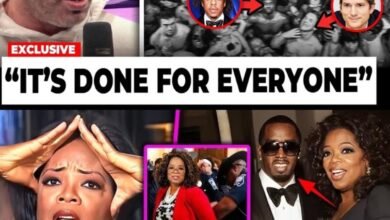Patriotic High School Students Defy Ban on Chanting “USA” with a Bold Response

In high school sports, where teamwork, competition, and school spirit collide, chants and cheers are a powerful way for students to rally behind their teams. But at one high school, a seemingly harmless chant of “USA” during games sparked controversy—and ultimately led to a battle over patriotism, free speech, and school policy.
When students from a local high school began chanting “USA” during their sporting events, they didn’t expect to find themselves in hot water. After all, the chant has long been a symbol of national pride, often heard at everything from international sports competitions to political rallies. But not everyone saw it that way. Soon after the students began their chants, parents received an unexpected letter from school administrators. The message? Stop chanting “USA.”
The Letter That Sparked Outrage
In the letter, school officials expressed concerns that the chant could be perceived as exclusionary or even offensive to some members of the community. The administration feared that the enthusiastic cries of “USA” might be misunderstood, especially in a diverse school where students come from various backgrounds.
The message left many parents and students stunned. For generations, patriotic chants have been a staple of American culture. To suddenly label it as problematic felt like a step too far for many in the community. What was intended to be a way to celebrate their country was now being framed as something negative.
But the students weren’t about to let the letter dampen their spirit. Instead, they crafted a response that was both respectful and resolute—one that showcased their love for their country and their right to express it.
A Patriotic Comeback
Rather than outright defying the school’s directive with hostility or protests, the students decided to channel their energy in a way that would make their message impossible to ignore. They organized a special “Patriotic Night” at one of their biggest sporting events.
On the night of the game, students arrived in droves, decked out in red, white, and blue from head to toe. American flags waved proudly in the stands, and some students even painted their faces with stars and stripes. Patriotic songs like “God Bless America” and “The Star-Spangled Banner” played in the background as students entered the stadium.
But the centerpiece of their response was a coordinated moment during the game. Instead of chanting “USA” throughout, they waited for the perfect moment—when their team scored a crucial point. Then, as if on cue, the entire student section erupted in a thunderous, unified chant of “USA!” The cheer echoed through the stadium, louder and more spirited than ever before.
Parents and Community Join In
It wasn’t just the students who took a stand. Parents, alumni, and community members who had heard about the school’s letter came to the event to show their support. Many wore patriotic clothing, while others brought signs with messages like “Proud to Be American” and “Free Speech Matters.”
The community’s involvement turned the event into a powerful display of unity and patriotism. What started as a school policy issue quickly transformed into a broader conversation about free expression and the importance of celebrating national pride.
School Officials Rethink Their Stance
The overwhelming response caught the attention of school officials, who were present at the game. Seeing the students and community come together in such a positive and patriotic way led them to reconsider their position.
In the days following the event, the school released a statement acknowledging the students’ right to express their patriotism and clarified their intentions behind the original letter. They emphasized that their goal was never to stifle free speech but rather to ensure that all students felt included and respected.
The administration also announced plans to work with student leaders and community members to find a balance that allows for patriotic expression while promoting inclusivity and respect for all students.
A Lesson in Civic Engagement
This story isn’t just about a chant—it’s about students standing up for what they believe in and engaging in a respectful dialogue with school officials. In doing so, they demonstrated the very principles that America was founded on: freedom of speech, the right to peaceful assembly, and a commitment to unity.
The students could have reacted with anger or defiance, but instead, they chose a path that was both bold and constructive. Their actions not only made their voices heard but also inspired others in the community to stand with them.
Conclusion
The high school students’ response to the ban on chanting “USA” serves as a reminder of the power of patriotism and the importance of standing up for one’s beliefs. In a time when division often dominates headlines, their story is a beacon of hope—showing that unity, respect, and civic engagement can lead to meaningful change.
Ultimately, the students’ chant wasn’t just about cheering for their team. It was a celebration of the values that make America unique—a land where everyone has the right to express their love for their country, loud and proud. And in doing so, they made their forefathers proud and reminded us all of the enduring spirit of American patriotism.




